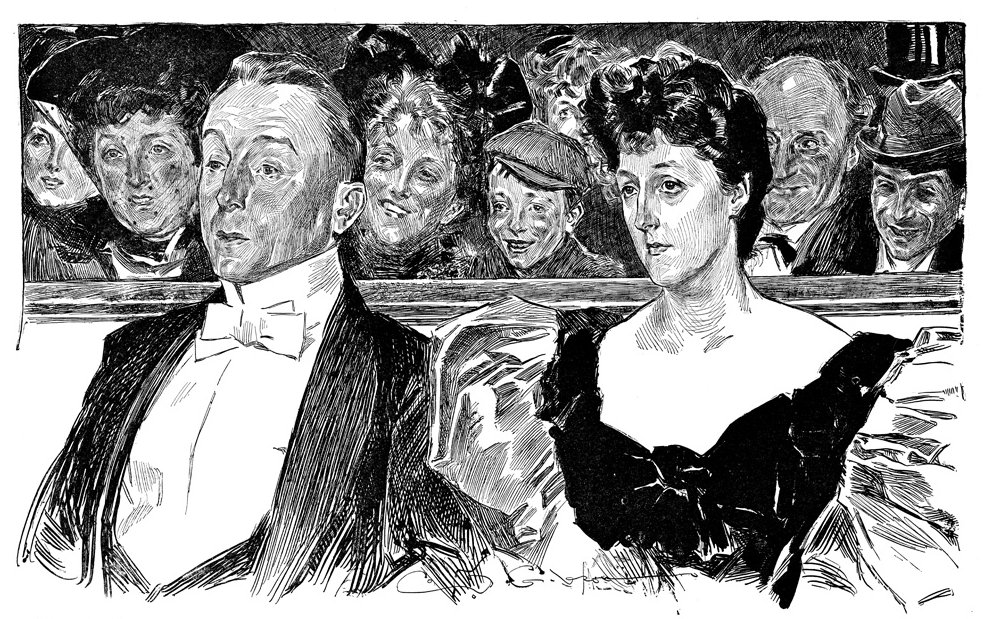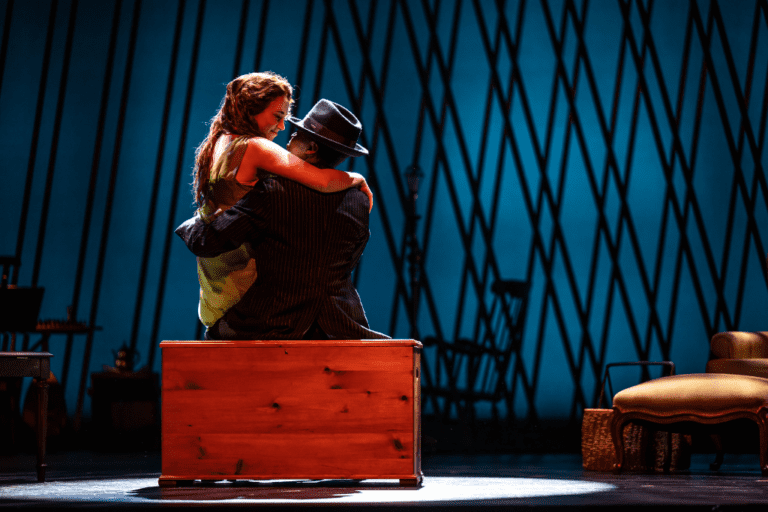Bursting the Bubble: On Audience Behaviour
“Loud talkers! Even a whisper is too loud when you’re in a theatre. In the bubble outside my head, I’m always thinking, ‘Do you realize I can hear you?!’” — Hugh Jackman commenting on audience behaviour he could happily live without during a run of The River
I am not a fan of “audience blame.”
I believe that if you lose an audience in a live theatre performance, it’s likely because you’re not doing your job as well as you should. But I’ve heard pretty persuasive arguments from colleagues over the years that there are times when an audience, collectively, can be a bad partner in the storytelling.
Colm Feore once stopped a performance and told the young students in the audience that if they didn’t stop throwing coins at the stage he would leave and not come back. David Clarke once picked up a coin that had been launched at him and threw it back at the audience. Scores of actors have complained about cellphone episodes. Food-munching episodes. Candy-wrapper episodes. Sleeping episodes. Harvey Fierstein has said, “In my forty-four years of trodding the boards, I have witnessed everything from people passing a whole roast chicken up and down a row, to someone trying to take down the script in dictation, to folks videotaping the show through cameras taped inside their hats, to guys getting blowjobs.”
I was performing on November 8 (“A day which will live in infamy”) in a “found space” (a bar). The piece was a Canadian POV–adapted version of American monologist Mike Daisey’s Trump Card. It was pretty much a flying-by-the-seat-of-your-pants performance—little rehearsal, fresh edits, and real-time interactive social media streaming and election updates. People were eating and drinking. Everyone there fully expected Ms. Clinton to win.
Now, it’s quite possible I may not have been very good in the piece. I accept that. And the election results weren’t what anyone expected. However, regardless of the quality of the work, there was one distinct audience member who acted out of line. He behaved like a boor, announcing in full voice, non-stop, how bored he was. And because of the material, subject matter, and unfolding historic US election debacle, I couldn’t help but think that the audience member’s behaviour was reflective of the current prevalent zeitgeist: “Say anything anytime regardless of who it offends.” A symptom of the reactionary popularism that has clearly burst our bubble and shattered our world as of late.
This entitled righteousness, this growing lack of respect for others, this rejection of some semblance of a social contract, this abandonment of civility, and this wholesale embracing of the NIMBY attitude seem, increasingly, to be many peoples’ preferred style of engagement in our society.
But the behaviour of one single attendee who sat in the November 8 Trump Card audience—an audience of sixty mostly game and curious folk—felt like something else.

Trump Card poster. By David Ferry, illustration by Chloe Cushman/National Post
The man wasn’t just talking sotto voce about the election. He wasn’t just ordering food or drink. He was deliberately trying to disrupt and offend.
It felt like an announcement. A statement of an agenda. And, because I was nervous and the audience was increasingly disturbed by the news streaming across the TV screen above and behind me, it seemed like an assault.
He didn’t like the piece Mitchell Cushman, Michael Wheeler, and I were presenting. He was bored and wanted everyone to know. He rejected overtures from other audience members and the bar owner to turn it down and show respect for the performers and others watching. If he hated being there he was going to take the rest of the audience down with him.
He clearly felt he had a “right.”
Think of the options this man had: He could have left. He could have asked for his $10 admission back (I would have given him $20 happily). He could have moved to the back room. He could have shut up, grinned and bore it, until the ninety-minute performance was over. But he chose to make a point. He chose to do the equivalent of Trump interjecting those childish and snide “WRONG!”s during the presidential debates. He chose to appropriate the intellectually and ethically slippery stance of “I’m mad as hell and I’m not going to take it any more.”
But most importantly, he broke faith with the ancient communal agreement between audience and storyteller. The agreement to listen to each other. To engage in one of the great acts of civility. To suspend ourselves in a beautiful bubble of disbelief until the story is done. (Honestly, if this person had simply been engaged in vocal disagreement with the politics of the piece or even just disliked the performative skill on display, I don’t think I would be writing this.)
And, just like Hugh Jackman, as I was performing I thought: “You know I can hear you?”
I was taken outside of myself. I lost my thread, the sense of being “inside the skin,” and I suddenly felt tired. I was disheartened.
Any of you who know me are likely thinking, “C’mon Ferry, that’ll be the day.”
But no… I really did feel that way.
The same way that so many might be feeling in the days of crushing pessimism that have followed the election down south.
That feeling has stayed with me. I hope, though, that I will rebound. I hope I will find the edge again. The desire to tell more stories.
And I hope too that all of us (the global “us”) will find the desire to pick up our bruised hopes and do something to make sure that we protect civility in the larger world.
I hope that there are other audience members out there who, when faced with boorish behaviour by a fellow audience member, will stand up and say “Sir/Madam, you are disrupting the performance for those of us who want to engage. Please leave.” I hope audience members will lean over a seat and politely but firmly say, “Please stop texting/talking/snoring/eating, and just LISTEN.”
I hope, too, that out there, in the larger audience of our citizenry, people will find the courage to say, “Stop treating that person that way. What you are doing is racist/sexist/homophobic and it is not acceptable.”
I hope that the world will soon right itself and find a way to hear everyone’s stories with respect and attention.
If not, there will be but one hand clapping. There will be but one story out there, and it will be a story of despair.









Comments